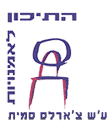Music Major
The Music Major is a nurturing environment and a home for students who see music as a central aspect of their lives and seek to acquire both practical and theoretical skills in music, with an emphasis on jazz, pop, and rock styles.
The program focuses on developing students’ skills as performers, creators, and listeners, while exposing them to a wide range of musical cultures from Israel and around the world. Students participate in a unique curriculum that includes learning and performing together, both within the school and outside of it.
At the heart of the program is a team with extensive experience in teaching and performance, continuing to train generations of young, successful musicians both in Israel and abroad.
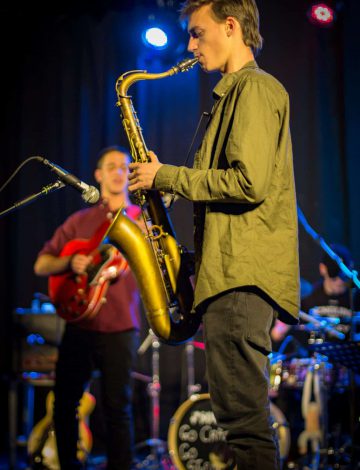


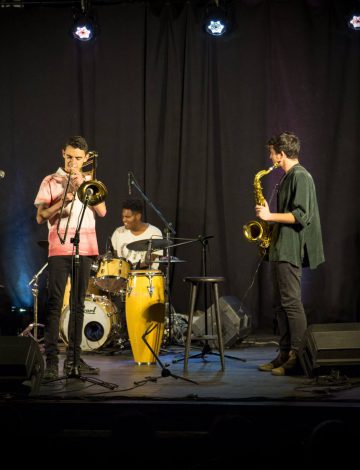
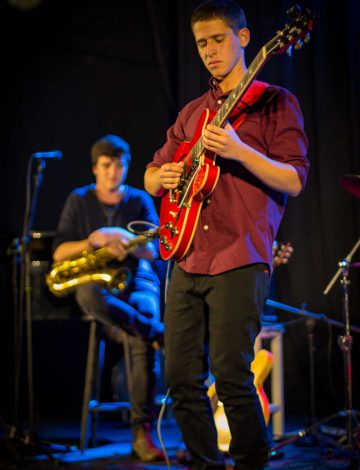
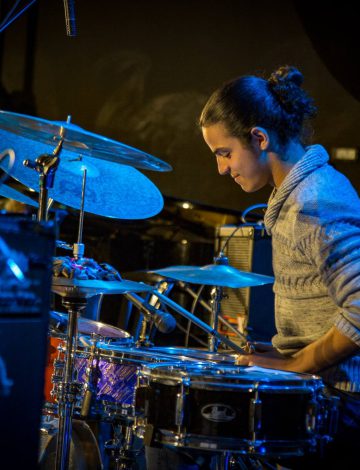
Goals
Developing musical and vocal skills, such as producing precise sound, rhythmic accuracy, mastery of musical instruments both practically and theoretically, and the ability to integrate into ensembles and the program’s concerts.
Fostering creativity and improvisation skills through playing styles where spontaneous improvisation is a significant component (blues, jazz, Latin jazz, jazz-rock, etc.).
Developing internal listening skills: melodic, harmonic, and rhythmic listening.
Developing theoretical skills, focusing on harmony in artistic music styles and jazz.
Developing active listening and analysis skills, and the ability to evaluate and appreciate masterpieces while understanding historical processes in the evolution of musical styles.
Educating students through music for meaningful lives, friendship, respect for others, etiquette, high moral values, openness and respect for different cultures, art, and education.
Preparing students for music matriculation exams that take place in 12th grade (option for 10 units).
Curriculum Overview
Music Ensembles and Vocals:
The emphasis in ensembles is placed on precise ensemble work, the ability to integrate into a group, accompanying and improvisation skills, technical abilities, and emotional expression. Starting in 7th grade, students are required to practice regularly and seriously in order to succeed in ensemble performances and meet the expectations of their fellow ensemble members. In 7th grade, students perform simple pop, rock, and jazz pieces. In 8th grade, the focus is mostly on popular pieces and the blues style. From 9th grade through 12th grade, the work focuses on ensemble playing around jazz styles, which is a significant part of the preparation for the music matriculation exam (5 units).
Jazz History Lessons: Part of the Program’s Unique Curriculum
A deep study of jazz styles is an integral part of the program’s unique curriculum. This includes: an introduction to jazz, ragtime, New Orleans and Chicago jazz, swing, bebop, cool jazz, hard bop, modal jazz, the 1960s, jazz-rock, Latin jazz, modern jazz, and Israeli jazz.
The course begins in 10th grade and continues through to the matriculation exam at the end of 12th grade. The curriculum includes guided listening, analysis of compositions, studying the biographies of jazz greats, learning the characteristics of various jazz styles, analyzing improvisations by legendary musicians, studying jazz arrangement techniques, all while applying some of these styles in the program’s ensembles. (2 units in the matriculation exam)
Rhythm, Theory, Harmony, Solfege, and Rhythms Lessons:
Rhythm Lessons:
7th grade focuses on developing precise rhythmic skills and internalizing time signatures in music.
The curriculum includes rhythm singing, dictations, group exercises, and more.
Theory, Harmony, and Solfege: Part of the program’s unique curriculum.
A long and significant learning process starting from 8th grade through to the matriculation exam in 12th grade.
Development of internal melodic, harmonic, and rhythmic listening.
Learning content: Intervals, scales, modes, building various types of chords, harmonic analysis, two-voice harmony up to four voices, bass harmony, melodic and rhythmic dictations, sight-singing, acoustics, and more.
Curriculum by Weekly Hours (What Each Student Receives)
7th Grade:
Ensemble 2 weekly hours, Rhythms 2 weekly hours, Solfege 1 weekly hour, Improvisation 1 weekly hour, Keyboard 1 weekly hour, Listening 1 weekly hour.
8th Grade:
Ensemble 3 weekly hours, Music Theory 2 weekly hours, Ear Training 2 weekly hours, Vocal Improvisation 1 weekly hour, Keyboard for Singers and Drummers 1 weekly hour.
9th Grade:
Ensembles 3 weekly hours per student, Harmony 2 weekly hours, Improvisation 2 weekly hours.
10th Grade:
Ensembles 3 weekly hours per student, Improvisation 2 weekly hours, Harmony and Solfege 2/3 weekly hours (depending on groups), History of Jazz 2 weekly hours.
11th Grade:
Ensembles 3 weekly hours per student, Improvisation 2 weekly hours, Harmony and Solfege 2/3 weekly hours (depending on groups), History of Jazz 2 weekly hours.
12th Grade:
Ensembles 3 weekly hours per student, Harmony and Solfege 2/3 weekly hours (depending on groups), History of Jazz 2 weekly hours.
For singers, there is a separate Vocal Improvisation lesson of 1 weekly hour.
Music Rooms and Equipment of the Major
The school has two well-equipped music rooms: pianos, sound systems for vocals and microphones, drum kits, guitar and bass amplifiers, and more.
Each room has two students responsible for maintaining order and holding the keys. These rooms are also used for 12th-grade students’ rehearsals for recitals, as well as for other students before their music exams.
Entrance Exams for the Major:
A. Performance of two prepared pieces, one vocal and one instrumental, in two different styles (jazz pieces are mandatory from level 2 and above).
B. Testing improvisation skills on a simple harmonic structure, such as blues.
C. Testing ear training potential by singing notes, intervals, and short melodies.
D. Testing sight-reading skills for notes, chords, and time signatures.
E. A short personal conversation with the program’s teachers, who will be assessing the candidate on that day.
If a student is not experienced in improvisation, it does not mean they will not be accepted into the program.
Significance
Music and vocal exams are held at the end of each semester for students in grades 7, 8, 9, 10, 11, and 12.
Students must prepare two pieces: one for ensemble and one as a soloist. (Grade 7 students prepare only one piece).
They are required to incorporate arrangement elements (intro, transitions, ending, harmonies, etc.).
Additionally, students must include improvisation in each piece and demonstrate theoretical knowledge and understanding.
מורי המגמה

Aharon Hnkin
Head of the high school division. Saxophone and clarinet teacher, international jazz musician. Graduate of the Rubin Academy of Music in Jerusalem in Classical Performance and Jazz. Arranger and conductor of the "Big Band" and "Dixie" ensembles at the Alpert Municipal Music Center. Former member of the Jerusalem Dixieland Orchestra. Certified yoga instructor in Jerusalem. Teaches Theory, Rhythm, and mentors ensembles.

Aharoni Benari
Guitarist, composer, and arranger. A graduate of the Jazz Department at the Jerusalem Academy of Music and Dance. Head of the Guitar and Ensemble Department at Hed College. Co-founder of the bands Tzlil Shechen and Atref. He has performed and recorded with Amikam Kimelman, Avraham Feldner, Boris Gamer, Yoni Rechter, and many other musicians. He continues to perform with Yoni Rechter, Shlomo Yidov, and the Israeli Dixieland Band. He teaches Music Theory, Composition, and mentors ensembles in the program.

Ayelet Hen
Vocal teacher, composer, and lyricist. Since 2006, she has been teaching in the Music and Theater Major. She leads school ceremonies and productions. She has performed with two vocal ensembles across the country. Over the years, she has composed for theater and written lyrics for songs by Rami Kleinstein. A graduate of "Rimon" College in Performance, she holds a Bachelor's degree in Social Work and is a trained emotional therapist. She teaches in the program, focusing on vocal improvisation, rhythm, vocal ensembles, and provides preparation lessons for recitals.

Aviran Ben Naim
Aviran Ben Naim – Pianist, trumpeter, composer, and arranger. A graduate of the Jerusalem Academy of Music with a Bachelor's degree in Jazz Piano and an Artist's degree in Composition. In addition to leading his own jazz ensembles and performing as a pianist in Albert Beger's quartet, he has been a member of the March Dondorma Orchestra since its inception in 2005. He performs and writes for this group, which has recorded 7 albums and participated in numerous festivals in Israel and abroad.
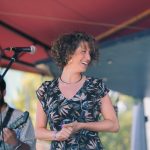
הילה הוטמכר
Music Major Coordinator for middle school. Singer, composer, and arranger. Winner of the DownBeat Award 2021 in the "Vocal Jazz Soloist" category. She has performed with her band internationally and in Israel. Based in Amsterdam from 2018 to 2022, where she recorded two albums. Graduated with honors from the Jerusalem Academy of Music and earned a Master's degree in Jazz Singing from the Amsterdam Conservatory. She has been teaching voice development and improvisation for the past 10 years and also teaches improvisation, ear training, vocal ensemble, listening, and solfege in the program.

Tal Gamlieli
Double bassist, composer, and leader of an international jazz trio performing at venues like Small's (NY) and Pizza Express (London), as well as major festivals in Europe. He holds degrees in Classical Performance and Jazz from the Jerusalem Academy of Music and the New England Conservatory. His second album received a review from Downbeat. Tal has toured and recorded with artists such as Avishai Cohen, Danilo Pérez, Dayna Stephens, and Liz Wright. Since 2011, he has lived in Jerusalem, teaching double bass and Jazz History at the Sadaf Conservatory.

Gilad Friedman
Pianist, composer, orchestrator, and arranger. Born and raised in Jerusalem. Founder and leader of the band Flat4, which blends jazz and rock, performing extensively in Israel and abroad. Released an album and singles, played in various projects in Israel, and taught theory for two years in Europe. He has been teaching piano and theory privately for seven years and has been a faculty member in the Communication Class at the school for the past four years. Teaches Harmony alongside Keyboard in the program.

Steve Paskoff
International guitarist, originally from the U.S. One of the most respected figures in Jerusalem jazz, a guitarist, teacher, composer, improviser, and arranger who has mentored generations of students and fans. He taught for many years at the Jerusalem Academy of Music and has performed on numerous stages in Israel and around the world. He teaches improvisation in the program

Omri Bar Giora
Guitarist and composer. A graduate of the program. He has worked with top musicians such as Reggie Workman, Matt Wilson, Steve Cardens, Daniel Zamir, and Amit Friedman. He released 'Deep Down', a duet album with harmonica player Ariel Bart, and his playing appears on various albums and projects. Omri holds a Bachelor's in Jazz and Contemporary Music from The New School, New York. He teaches improvisation and mentors ensembles in the program.
